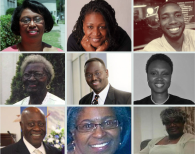By Taryn Smith
Victims of the 2015 Charleston church shooting
Charleston
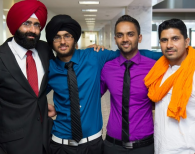
This week, Charleston, SC grieves over the losses of nine worshippers from the Emanuel African Methodist Episcopal Church, after a gunman opened fire during a midweek prayer meeting. The suspect in this hate fueled attack in a historic Black church is now in custody.
For Oak Creek, WI citizens, the tragedy in Charleston is particularly resonant. In 2012, a white supremacist walked into the Sikh Temple of Wisconsin and killed six worshippers and injured a police lieutenant, who was shot 15 times. Their story is featured in Not In Our Town documentary, Waking in Oak Creek.
Today we share with you messages from Oak Creek to Charleston.
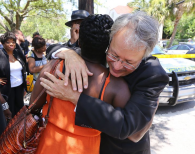
Not In Our Town traveled to Charleston, South Carolina to document stories from the community in the days after the horrific hate crime attack that took the lives of nine members of the Emanuel African Methodist Episcopal Church on June 17, 2015. This short video is designed to prompt reflection and discussion for community and faith groups about how we can take local action in response to hate.
Not In Our Town is presenting a series of discussion questions for faith, community, and educational groups to use with the short video Charleston: The Days After.
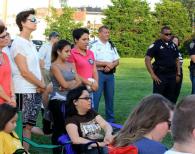
As a result of the tragedy in Charleston, Not In Our Town has reached out to its Law Enforcement Leaders Network to highlight how their agencies and their communities have come together to honor the victims and fight intolerance and hate.
Princeton, New Jersey
The community came together to support Charleston. Read more at NJ.com and see this video from Not In Our Town Princeton.
Bowling Green, Ohio
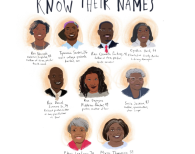
As the community of Charleston, SC continues to reel from a horrific hate crime, we feel it is important to take time to honor and remember those who lost their lives at “Mother Emmanuel” AME Church one week ago. Below are the names and a brief description of each of the nine church members killed by a 21-year-old white supremacist last Wednesday. Click here to see further messages of support and to leave your own.
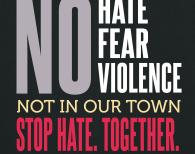
On June 17, nine people lost their lives at a Bible study inside Charleston, SC’s historic "Mother Emanuel" AME Church, at the hands of a 21-year-old man, poisoned by racism and hate. People grieving and filled with outrage are asking: What can we do? The most effective way to respond to the hate attack in Charleston is to take action locally. Over the last 20 years, Not In Our Town, a movement of people across the country working to stop hate and bullying, has learned one indisputable thing: The solutions to hate violence and bigotry require each of us to participate.
Here are three ways you can take immediate action and stand up to hate
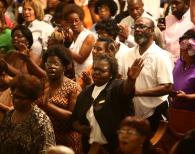
One moment, people were praying in the historic Emanuel African Methodist Episcopal Church in Charleston, SC, and the next, nine people were shot to death. Our hearts reach out to the friends and families of Rev. Sharonda Coleman-Singleton (45), Tywanza Sanders (26), Cynthia Hurd (54), Rev. Daniel Simmons Sr. (74), Rev. Depayne Middleton (49), Susie Jackson (87), Ethel Lee Lance (70), Myra Thompson (59) and Rev. Clementa C. Pinckney (41), church pastor as well as South Carolina State Senator.
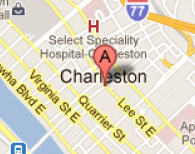
There is a moment in the documentary, Light in the Darkness, that has lingered with West Virginia resident Paul Sheridan.
In the film, Patchogue, N.Y. mayor Paul Pontieri returns to the intersection where Ecuadorian immigrant Marcelo Lucero was murdered. Pontieri meets a man, he discovers, who has been a neighbor to Pontieri’s family for 25 years.
“I didn’t know who he was,” Pontieri says. “Do they make themselves invisible, or do we make them invisible by not seeing them?”
It’s a relevant question for many communities with changing demographics. Sheridan, a community leader who cares about safety and inclusion, asks, “What are the communities that we are blind to? That’s the question that hangs in the air a little bit, and we haven’t really thought through how we’re reaching out.”

What can you do when a notorious hate group targets a wide array of institutions in your community, each of which has its own leadership, values, and organizational methods?
That's the situation that faced Charleston and Wheeling, West Virginia in March, when Fred Phelps' Westboro hate group announced it would picket Catholic and Jewish institutions in the two towns, a local university, and a mine where more than a dozen miners had recently lost their lives.
What they came up with was "West Virginia: No Place for Hate," a multi-pronged action campaign that was featured on NIOT.org last month.
NIOT executive producer Patrice O'Neill spoke to some of the campaign leaders, including members of OneKanawha, the NIOT group in Charleston. "Turning Hate into Opportunity in West Virginia" features the lessons they've shared.
